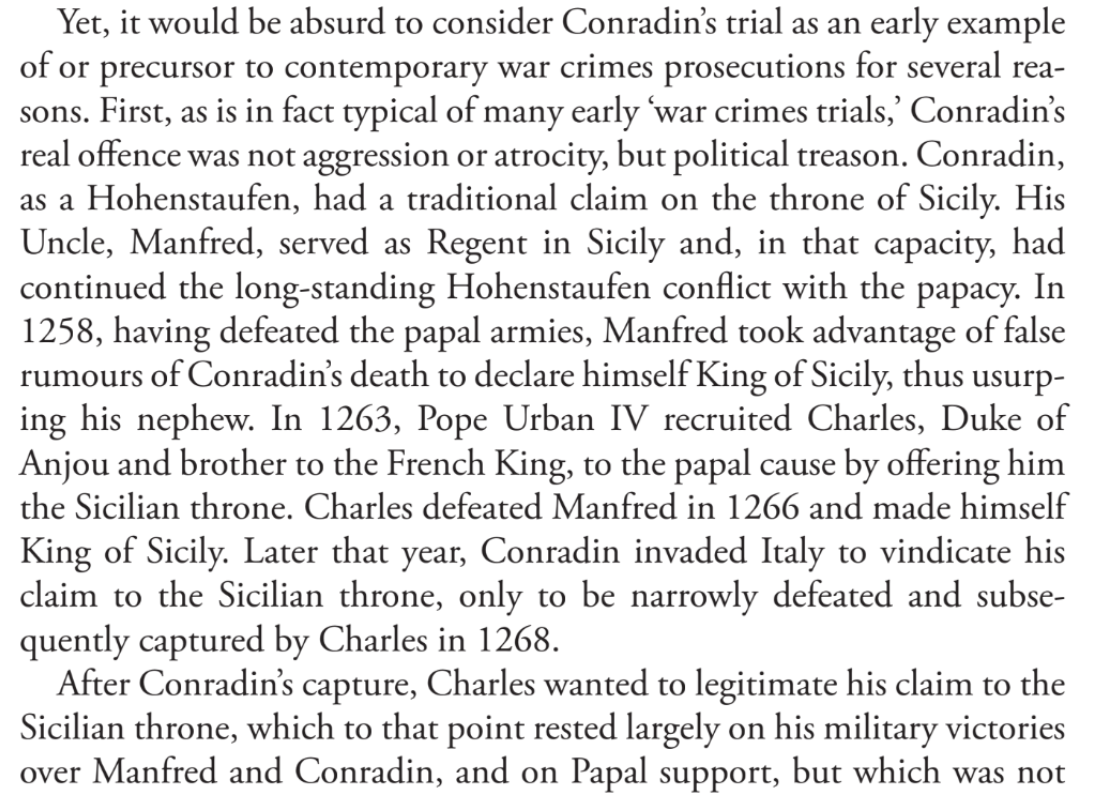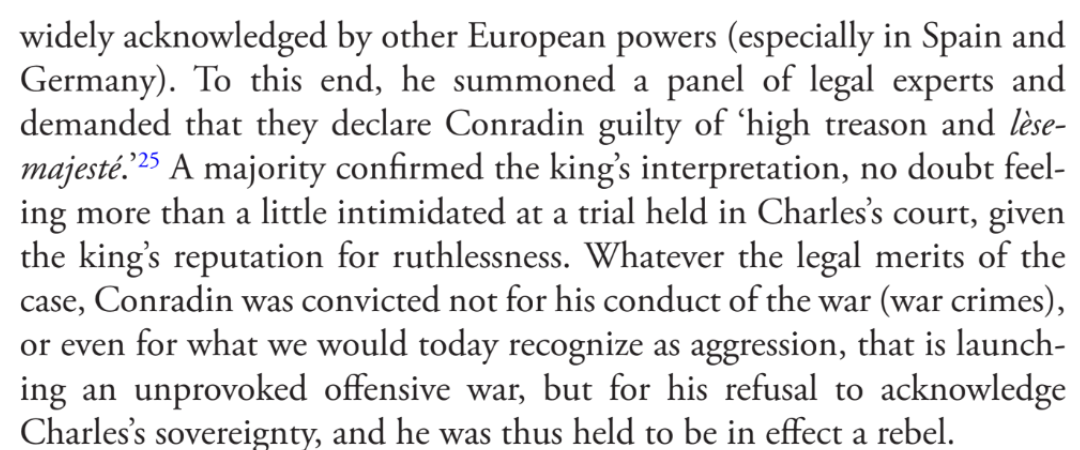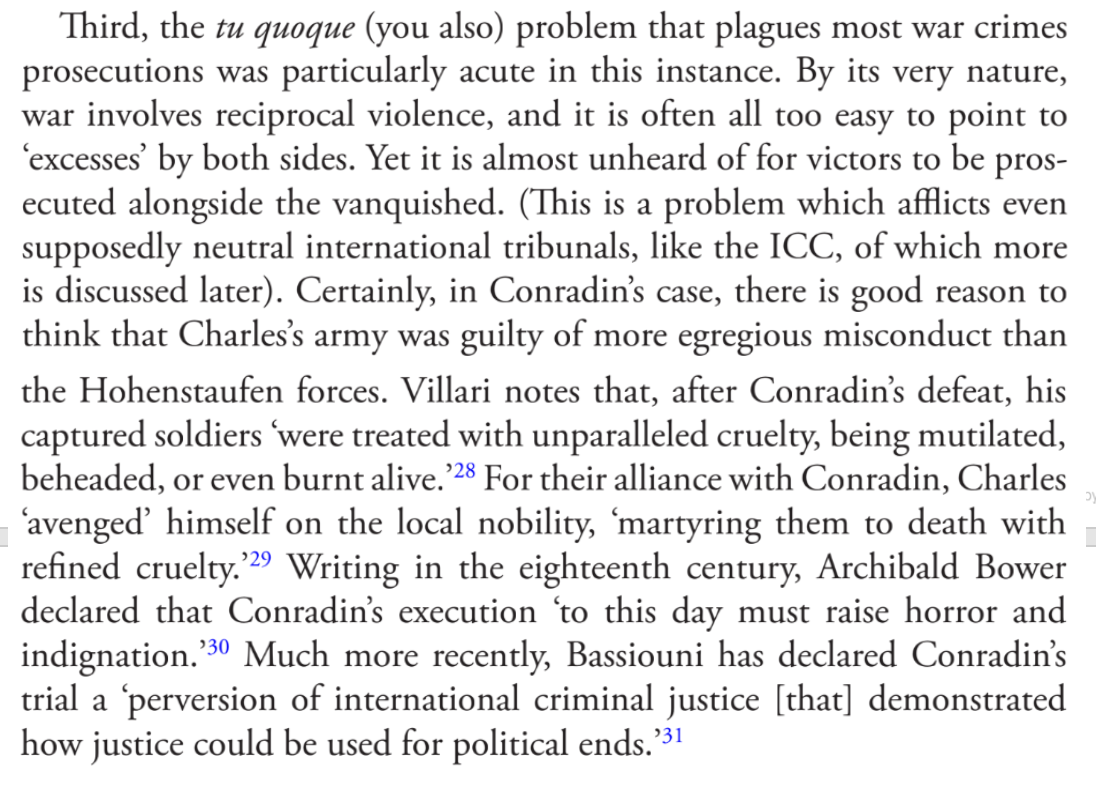John Strachan's answer cited one account of what crimes Conradin was charged with, which comes from Virginia Journel of International Law, vol 50, issue 2. [2010]
“Perspective on International Criminal Justice”.: M. Cherif Basiouni.
But I have found many other statments about what alleged crimes Conradin was charged with in recent decades going back in time to Levi, Albert G. D., “Criminal Responsibility of Individuals and International Law”. University of Chicago Law Review, Volume 12, number 4, June 1945, p. 120.
https://chicagounbound.uchicago.edu/cgi/viewcontent.cgi?article=2170&context=uclrev
In my post number 8 at: https://historum.com/threads/what-alleged-crimes-was-conradin-accused-of.192567/#post-3573795 I list various sources which say that Conradin was beheaded for starting an unjust war or a war of aggression, or that he was beheaded for treason against the pope and/or KIng Charles, or that he was beheaded for war crimes and atrocities committed by his army.
And of course even 77 years from 2022 back to 1945 is only 0.102 of the time period from 2022 back to 1268. The books I cited in my original question would no doubt quote much more comtempoarary sources.
K. Hampe, Geschichte Konradins von Hohenstaufen (Berlin, 1893)
F. W. Schirrmacher, Die letzten Hohenstaufen (Göttingen, 1871)
E. Miller, Konradin von Hohenstaufen (Berlin, 1897)
del Giudice, Il Giudizio e la condanna di Corradino (Naples, 1876)
But I don't read those languages or have access to libraries which would have them.
I have found on translations of sources which were much closer to the time.
Giovanni Villani's Nuova Cronica (c. 1300-1346), Book VII, Chapter 29, says:
And when the king had Conradino and those lords in his hands, he took counsel what he should do. At last he was minded to put them to death, and he caused by way of process an inquisition to be made against them, as against traitors to the Crown and enemies of Holy Church, and this was carried out; for on the . . . day were
beheaded Conradino, and the duke of Austria, and Count Calvagno, and Count Gualferano, and Count Bartolommeo and two of his sons, and Count Gherardo of the counts of Doneratico of Pisa, on the market place at Naples, beside the stream of water which runs over against the church of the Carmelite friars; and the king would not suffer them to be buried in a sacred place, but under the sand of the market place, forasmuch as they were excommunicate
...And it seems that by reason of Conradino's innocence, which was of such tender age to be adjudged to death,...
https://www.gutenberg.org/files/33022/33022-h/33022-h.htm#VII_29
So that is a relatively early statement that Conradin and his companions were sentenced for treason against King Charles and being enemies of the church.
Giovanni da-Legnano, Tractatus de Bello, trans. J.L. Brierly (1917) Tractatus de bello, de represaliis et de duello : Legnano, Giovanni da, d. 1383 : Free Download, Borrow, and Streaming : Internet Archive
Chapter XXX asks: Whether quarter should be granted to the general of a war when captured?
Solution: I believe the first statement to be true, namely, that quarter should be given to one who humbles himself and does not resist, unless the grant of quarter gives reason for fearing the disturbance of the peace, in which case he must suffer. This is proved by the text in ch. noli, at the end, where it says "especially when disturbance is not feared"; and Hugo and the Archdeacon explain that "especially" is used for "only," so the sense of the passage is quarter is to be granted only when disturbance of the peace is not feared, and otherwise not. And it is said that on that interpretation Charles caused Conradin to be beheaded.
Chapter LXIX: "Whether mercy should be shown to persons captured in a lawful war?"
Should mercy be shown to person captured in a lawful war? We must say that it should, unless by sparing them there is fear of a disturbance of the peace. This is proved by xxiii, q. 1, Ch. 1, noli, at the end; and on the authority of that chapter, as understood by Hugolinius, Conradine was beheaded.
these do not discuss the legality or criminality of Conradin's actions, but whether it would be leagal to put to death prisoners of war and enemy commanders, and the only precedent it gives is the case of Conradin.
So I hope that someone can cite more authoratative sources for what crimes Conradin was accused of and beheaded for.


